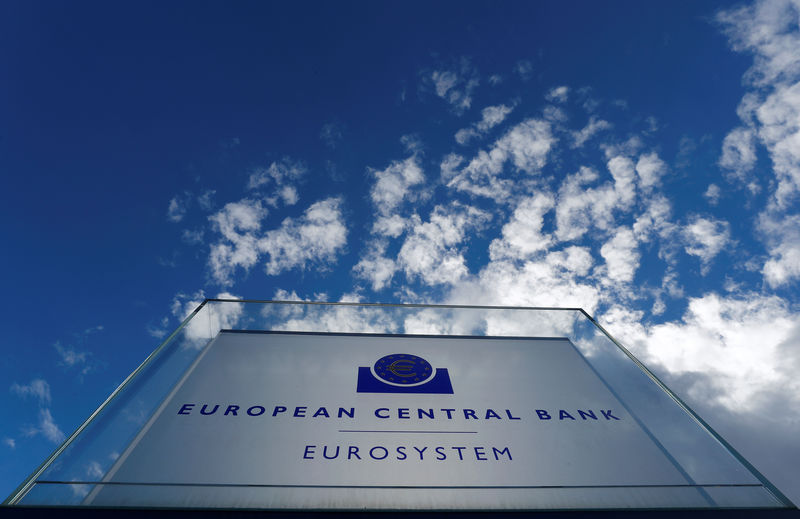By Shrutee Sarkar and Richa Rebello
(Reuters) - The European Central Bank has no prospect of raising interest rates through to the end of 2020, according to economists in a Reuters poll who said its next policy move will be to tweak its forward guidance towards more accommodation.
But the May 24-30 survey of more than 100 economists also showed almost no change to euro zone growth and inflation forecasts, nor any change to the probability of recession, despite clear evidence that the bloc's economy is under pressure.
ECB officials have already raised the prospect of further support and said the central bank is willing to keep negative interest rates for longer if necessary, coming alongside a global shift by policymakers towards easing.
"The economy is not going to pick up very much and inflation is going to remain very low," said Andrew Kenningham, chief Europe economist at consultancy Capital Economics.
"They will have to strengthen forward guidance by showing that they are willing to cut rates if necessary, keep them lower for longer, and eventually relaunch the asset purchase program if required," he said.
The median forecast from the poll showed no change in the deposit rate, currently at -0.40%, through the end of next year. One month ago, the forecast was for a hike to -0.30% in the third quarter.
Of the 60 contributors who provided a view out until the end of next year, 28 expected a deposit rate hike at some point between now and then. Two expected a cut and the rest forecast no change.
A few months after shutting its 2.6 trillion euro asset purchase program (APP), the ECB launched in March a third round of Targeted Long-Term Refinancing Operations, essentially cheap loans to banks, to prevent an economic slowdown from worsening through any sudden crunch in lending.
Economists who answered an additional question on the terms likely offered in the first round in September of what is known as TLTRO-3 said the interest rate charged would be a median -0.20%. The forecast range was -0.50% to 0%.
Over half of economists answering a question about its next steps said the ECB would tweak forward guidance before the end of the year. Other answers were that the bank would launch more TLTROs, cut interest rates or re-launch the APP, also known as quantitative easing (QE).
But it is clear some economists are skeptical about how effective the ECB can be at this stage, despite its regular assertions that it has the necessary tools.
"I think in the conventional space there is very limited room," said Elwin de Groot, head of macro strategy at Rabobank. "The same goes for forward guidance: how long can you say that interest rates will stay on hold? So, they will be pushed into the unconventional area again and the most likely candidate then will be quantitative easing."
A December Reuters poll showed a majority of economists saying the ECB was right to shutter QE, but conviction around that view had faded in the months running up to the decision.
"I think in retrospect it was a mistake. Had they known how much the economy was going to slow and by how much they were going to reduce their own forecasts for inflation, I'm pretty sure they would have continued with QE this year," said Capital Economics' Kenningham.
Quarterly growth forecasts ranged between 0.3%-0.4% until the end of next year, according to the poll, with the growth outlook for 2019 and 2020 steady at 1.2% and 1.4%, respectively.
Inflation, which is expected to miss the ECB's target ceiling of 2% this year, next year and in 2021, was forecast at 1.3% for 2019, 1.5% for 2020 and 1.6% in 2021.
But the median probability of a euro zone recession was unchanged from the previous Reuters poll, at 20% in the next year, rising to 30% in the next two years.
Both figures are lower than probabilities polled for the United States, at 25% and 40%, respectively.
Given the U.S. has outperformed most of its peers for a long time, it suggests economists may be underestimating the risk of a euro zone recession, especially given how much the bloc's economy relies on exporting to the rest of the world.
"If the Trump administration decides to raise tariffs on the other part of Chinese goods going into the U.S., that would probably be the last straw," said Rabobank's de Groot.

"I think that would really raise the possibility of a recession in the euro area as well in 2020."
(Polling by Tushar Goenka, Editing by Ross Finley)